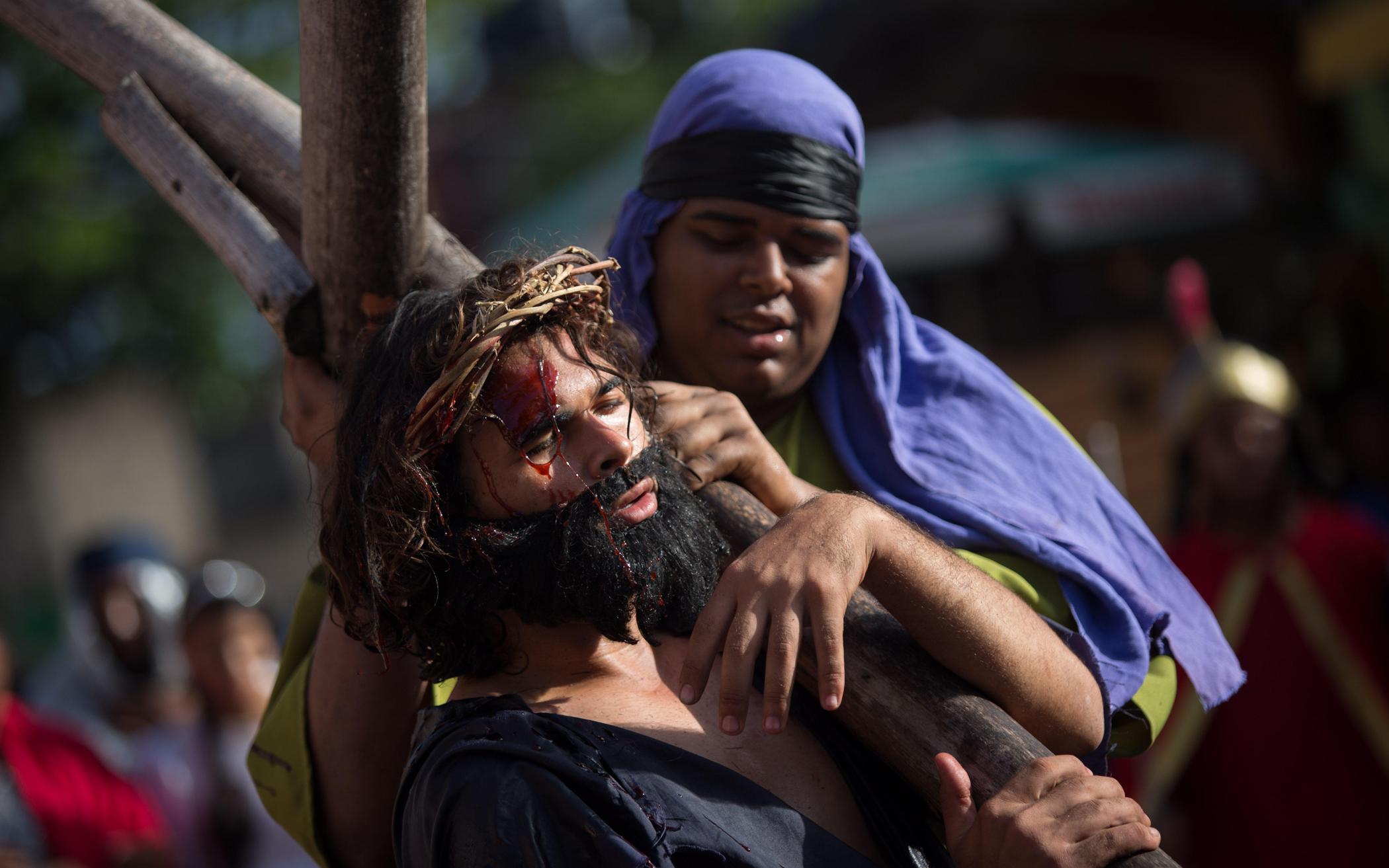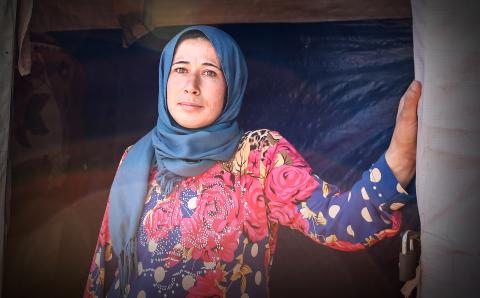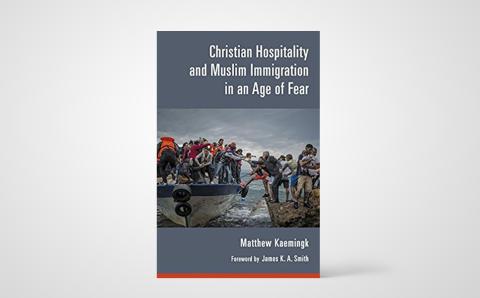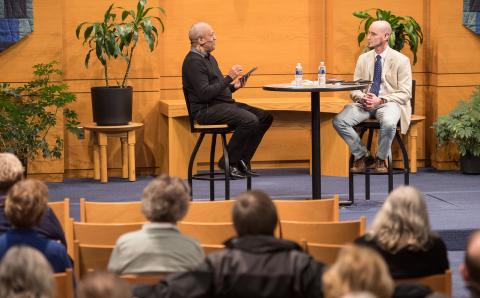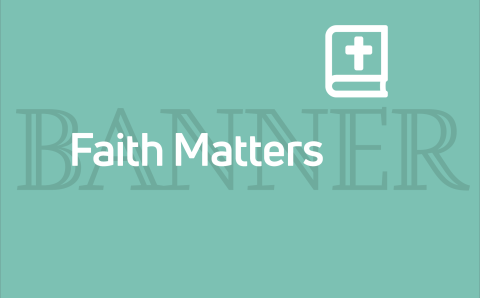Growing up in a Dominican home in Miami meant that when dinnertime rolled around, I could expect a plateful of rice and beans with a serving of news headlines from the Spanish television network Univision. While my mom was working her magic with sazón in the kitchen, getting ready to feed what seemed like an army of 50 soldiers, my dad was recuperating in front of the television after a long day’s work at the auto-body shop. Looking back, I’m not exactly sure how well the Federal Communications Commission regulated Spanish television programming back in the 80s and 90s. One news program was called “Primer Impacto” (“First Impact”); it specialized in showing things you would never see on any other network.
One of the images that’s stuck with me after all these years happened every year during Holy Week. Inevitably, on Good Friday, “Primer Impacto” showed people throughout Latin America marching through the streets of their cities and carrying large crosses on their backs as a way of reenacting the sufferings of Jesus Christ. I remember once asking my mom where the person with the cross on his back was going. She responded, “They are going to tie that man to his cross and crucify him in front of everyone.” Though no one was actually put to death, the practice continues today. Some participants are flogged prior to the procession and then are nailed by their hands and feet to the crosses they have carried.
In Luke 9, when Jesus shared with his disciples that he would be crucified and then resurrected, he followed the revelation with a declaration that all who would come after him must deny themselves, take up their crosses daily, and follow him (v. 23). For those of us north of the U.S.-Mexico border, this graphic portrayal of crucifixion in Latin America during Holy Week forces us to consider what the apostle Paul meant when he wrote “I have been crucified with Christ . . .” (Gal. 2:20).
As followers of Christ, we must recognize that the crosses we have been called to carry are much heavier than the weight of two wooden beams. These crosses may come in the form of a struggle with seizures, the loss of a child, a mental illness, a chemical dependence, or a besetting sin. Our procession with them may last an entire lifetime.
Yes, as followers of Jesus Christ, we have been called to deny ourselves and follow him. But let’s explore how the cry “It is finished” shapes our posture as we carry our crosses.
“It is finished” comes from Psalm 22. The evidence indicates that Jesus may have been reciting Psalm 22 in its entirety while he laid down his life on Good Friday. Though Jesus quotes other psalms from the cross, consider the following statements from Psalm 22 and their connection to his crucifixion:
- “My God, my God, why have you forsaken me?” (v. 1).
- “All who see me mock me; they hurl insults, shaking their heads” (v. 7).
- “All my bones are on display; people stare and gloat over me” (v. 17).
- “They divide my clothes among them and cast lots for my garment” (v. 18).
While it is difficult to determine with certainty what prompted the psalmist to write these words that eventually made their way to the lips of our Lord, we can profess that no prophecy is of private interpretation. The prophets spoke as they were carried along by the Holy Spirit.
One thing is certain: The sufferings of the psalmist of Psalm 22 prepare us for and find their fulfillment in the crucifixion of Jesus Christ. As we reflect on the death and resurrection of our Savior, let us never forget what Jesus was doing while he hung on the cross: He was singing! Please resist the temptation to separate the lyrics from the melody in Psalm 22. The psalms were meant to be sung, and Jesus was no doubt singing the melody as he recited this psalm from the cross.
We could take it one step further and call the entire ministry of Jesus, from Bethlehem to Calvary, the Song of Redemption. The birth of Christ was filled with the sounds of a choir: Zechariah sang, Mary sang, and the angels sang. Jesus was born to the sound of music! But saying “Hallelujah” when a child is born is one thing. Still having a melody in your heart as you descend into the valley of the shadow of death is a miracle. But this is exactly what happened to Jesus. We know that the Messiah sang with his disciples on the night he was betrayed. And the Bible says that after the institution of the Lord’s Supper, Jesus and his disciples sang a hymn before they went out to the Garden of Gethsemane to pray. The psalm in that upper room was then followed by the song on the cross.
On Good Friday, Jesus masterfully selected the perfect psalm to serenade his sheep. The movement of Psalm 22 is powerful. The song begins as a lament but concludes with praise. In verse 1, the psalmist cries out, “My God, my God, why have you forsaken me?”, but concludes by shouting, “He has done it!” (v. 31)—in other words, “It is finished.” Verse 22 marks a major shift in the tone and pace of this song as the psalmist declares, “I will declare your name to my people; in the assembly I will praise you.” The song Jesus sang on Good Friday is a source of incredible hope for every believer.
Consider for a moment what may have caused the psalmist to modulate his song from lament to praise. Perhaps God opened his heart to see a divine power that works all things together for good and transforms a curse into a gift. We know that Jesus endured the weight of the cross because of the joy set before him. The point is that both the psalmist and Jesus never stopped singing—and neither should we.
Our journey may be marked by pain and agony, but it will not be defined by these things. No, the end of the song on Good Friday marks a new beginning for the redeemed because it shows us that the Messiah accomplished what we could not do for ourselves: the forgiveness of our sins and the redemption of his world. Jesus came to save us, and he calls us to follow him by carrying our crosses daily.
It’s been years since I’ve tuned in to “Primer Impacto,” but I can still see my mom in the kitchen and my dad on his favorite chair. This Good Friday I’ll be leaning in to listen for another voice—the voice of a Savior who invites all of those who are following him home to join the Song of Redemption.
About the Author
Felix Fernandez is pastor of South Kendall Community Church Miami, FL.

